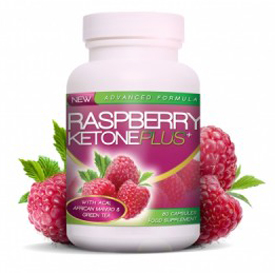Is Dr. Oz more showman than doctor? His theatrical endorsement of dubious weight loss products points to the former. On his show this week, in a 75-second segment, he introduced a ‘revolutionary metabolism booster that you’ve never heard of’: raspberry ketones. While displaying a generic purple jar of capsules, Dr. Oz said, “I have vetted these; I’ve looked at them carefully; I am absolutely enamored. I know they work.” His segment assistant Lisa Lynn, a supplement-selling personal trainer, was by his side, along with a morbidly obese woman who had “tried everything.” Was Dr. Oz laying it on thick for a questionable product? No, not when you consider Dr. Oz is on TV.
Raspberry ketones are compounds that give red raspberries their aroma. In the US, they are used primarily in the food flavor industry. In Japan, however, raspberry ketone capsules are used as a weight loss supplement. Raspberry ketones are not to be confused with blood ketones produced in diabetes and on very low carbohydrate diets.
The hypothesis is that raspberries ketones affect biological activities that alter lipid metabolism. That fat-blasting claim rests on two small mice studies that show when mice are fed a high-fat diet supplemented with raspberry ketones they gain less body fat than expected. But be clear: raspberry ketones have not been studied in humans and they have not been proven to work. To be fair, Dr. Oz said, “There have not been a lot of human studies, but animal studies are favorable.” Somehow, for me, that got lost in the hype.
To strengthen his points, Dr. Oz asked Lisa if she has “lots of clients who swear by raspberry ketones.” Lisa agreed they “swear by it” and she has seen “firsthand results from these products.” Her word is apparently meant to substitute for randomized controlled research published in peer-reviewed journals. 
Lisa goes on to recommend a dose of ‘100 mg at breakfast and, if that amount isn’t giving you optimal results, take another 200 milligrams at lunch.’ That dose, 100 to 300 mg/day, is the human dose equivalent of what worked in laboratory mice. Unfortunately, that dose costs around $20 to $60 a month, for a still unproven product.
For anyone unwilling to take a supplement, eating raspberries will also work, according to Dr. Oz and Liza. But, while raspberries are good food, that won’t do the fat-busting trick: it takes 90 pounds of raspberries to extract the daily dose of raspberry ketones. Raspberry ketone capsules are actually synthesized in the lab because supply is scarce, demand is growing, and they are expensive.
And so, did Dr. Oz lead us astray on the raspberry ketone claim? He did if you believe he has a medical obligation to the viewer. Call me jaded, but I believe Dr. Oz’s only obligation is to his network. I don’t say I agree with it, but it is what it is, at least for today. We, the viewers, are obligated to watch out for ourselves and our families. We are obligated to distinguish between legitimate medical fact and TV hype. It makes sense to be wary of products that promise a quick fix and dramatic results, regardless of the credentials of the person who said it. Never give credit to recommendations based on small animal studies, and realize that supplement makers depend on gullible TV viewers to buy useless products. Dr. Oz may think his endorsement jives with the Hippocratic Oath to “first, do no harm,” and he’s right. Raspberry ketones have not been shown to be harmful to humans, yet.
Also Read:
Raspberry Ketones Touted as Miracle Fat Burner by Dr. Oz
A Magic Pill: What You Need to Know About Diet Pills
Dr. Travis Stork Prescribes Simplicity of Walking for Heart Health
